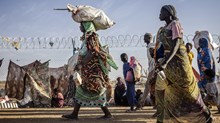Two Iranian Christians were charged with "apostasy" and several others arrested as Iran's parliament approved a bill making the death penalty mandatory for those so convicted.
The measure is part of a new penal code that easily passed in parliament in a 196-7 vote on September 9. Christian and Baha'i communities are most likely to be affected by the bill.
But one source told Compass Direct News that when he discussed the apostasy section with some members of parliament, they said they were unaware of it. The source argued that the Iranian government was trying to bury the bill in the 113-page penal code.
Current Iranian law considers apostasy (leaving Islam) a capital offense, but punishment is left to the discretion of judges.
The Guardian Council, Iran's most influential body, must approve the penal code before it becomes law. Sources say they expect the council, which comprises six theologians and six jurists, to approve it.
Under the past three decades of Iran's Islamist regime, hundreds of citizens who have left Islam and become Christians have been arrested for weeks or months, held in unknown locations, and subjected to mental and physical torture.
The government last executed an Iranian Christian convert from Islam in 1990, though six other Protestant pastors have been assassinated since the execution of Assemblies of God pastor Hossein Soodmand.
Now Soodmand's 35-year-old son, Ramtin Soodmand, is among five Christians arrested in three cities in August. Authorities have not said what the charges are, but sources say they may be charged with spying for foreign powers—a less serious offense than apostasy. Hossein Soodmand was similarly accused of being an American spy.
"Christians are viewed as potential spies allied with Israel or America," said a source who works closely with Iranian refugees, adding that the overwhelming number of Iranian Christians he counsels have been intimidated by police, leading them to flee Iran.
He also believes that the rapid growth of Christianity frightens Iran's government. "They see it as something they cannot control," he said, "so they are afraid of house churches."
Another expert on Iran believes Christians outside the country are partly responsible for the persecution. When Christians claim there are thousands of house churches throughout the country, he said, Iranian authorities feel threatened.
"[The police] are obligated to crack down on Christian activities when these activities become too public," one Iranian Christian said.
The timing of the penal code debate and the arrests are not coincidental, said Joseph Grieboski, founder of the Institute on Religion and Public Policy. While the international community is focused on Iran's nuclear activities, he said, the Iranian government appears to be taunting the West with deliberate human rights violations.
"Because of the nuclear issues, ones like these get put on the back burner, which means that the regime can move with great liberty to install legislation like this with impunity, because the nuclear issue gives them cover," said Grieboski.
But the acts also may signal desperation, he said. "I have to say the Iranian regime is tightening severely its control over as many aspects of the lives of Iranian people as they possibly [can]. And that, I think, is the sign of a weakening regime."
Copyright © 2008 Christianity Today. Click for reprint information.
Related Elsewhere:
The New York Times and Reuters wrote about Iranian President Mahmoud Ahmadinejad's meeting with religious leaders last week.
Christianity Today recently wrote about Muslim-background believers in the United States and Iranian Christians. Also, see Christianity Today's previous coverage on Iran.

Support Our Work
Subscribe to CT for less than $4.25/month


















